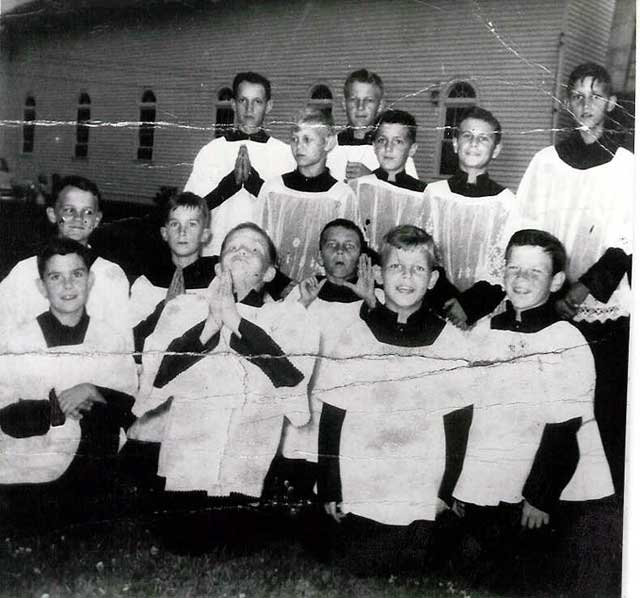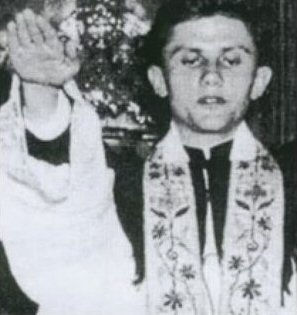Back in the day my big brother Pat, our neighbor Rick and I would walk the mile or so to school together. Our brother Dan would come with us after several years, but for a long time it was mainly just Rick, Pat and me. We went to Saints Peter and Paul Elementary in Merrillville, Indiana. I started the first grade in the fall of 1963.
Mass was said every day before school. Mass was still said in Latin and the priest had his back to the congregation so it was a bit of an exercise in patience for kids my age. Since Sunday is a Holy Day of Obligation (I’m never sure where to capitalize in these cases) we went to mass six days every week during the school year. Six masses a week is probably more than enough for most elementary schoolers, so we took our time getting to school, investigating every puddle and stopping by every construction site. We took every detour and long-cut we could find through woods, across vacant lots and yards. As long as we got to church for Communion each day, our teachers never seemed to mind too much. There were fewer children to keep in line when the walkers came in a little later.

So we lollygagged and teased and played and chased. There were some months back in about 4th grade when Rick and I each kicked a can to school, parked it in some empty lot, retrieved it after school and kicked it all the way home. Since there were no Catholic school girls in our neighborhood around our age, we often talked about the girls we had crushes on – the “tough” girls. We were too young for any real business, but we talked a good game.
“Would you kiss Barbara Hunter?”
“What, are you kidding?! Of course I’d kiss her. Would you kiss Shelley Haas?”
“Cut it out, barf bag! I wouldn’t kiss her Shelley The Belly for a million bucks!”
“Oh, I’d do it for a million bucks.”
“Well, yeah, maybe I’d do it for a million bucks. But not for a thousand!”
There were tours of altar boy duty for all of my friends and me. One week out of every month or two we would have to wake up early and walk to school by ourselves; before any of the other boys and girls or even the teachers. In wintertime we’d even have to walk in the dark. I hated walking to school by myself in the dark. We’d meet in one of the rooms in the old church behind the sanctuary, put on long black robes with buttons from our neck to the floor, and starched white tops.

It smelled like incense and Old Spice and smoke. It smelled like old men and musty cloth. We made sure the cruets were filled with water and wine from a tiny refrigerator and a few other preparatory duties. I always wondered how the priests could take a drink of wine every morning that early. I guess they could hold their wine. And, of course, they were doing it for God. I can’t say I didn’t sneak a sip or two when I was altarboying with my brother Pat. I can’t exactly remember, but I’d bet it was his idea – not mine.

There were a couple cigarette lighters, the old fashioned steel ones with a flint wheel and wick. The smell of the lighter fluid seemed so grown up. We would push the waxy wick forward in the candle lighter and lightly touch the flame to the candles, getting everyone settled for mass. That was my favorite duty as an altar boy. All the people in church had their eyes on you as you lit the candles. Everyone got quiet. The atmosphere became expectant. It was the only time where using fire was not only sanctioned, but expected.
Some of the priests were rather aloof and hardly spoke a word to us. They were probably lost in thought. After all, they had sermons to write, mass to say, important theological matters to consider. Others seemed to pay TOO much attention and listened and critiqued our Latin prayers and watched carefully to make sure we rang the bells at the precise time, held the golden platters (the patens sp?) just so under every person’s chin at communion to be sure that every host accidentally dropped was caught before it hit the floor. I always wanted to catch a dropped or fumbled host, to save the day for the Body of Christ as it were. I was ever watchful and ready to spring into action. I daydreamed of leaping forward in slow-mo, crashing to the floor but keeping the paten steady, getting up bruised and bloodied, holding up the consecrated host while everyone cheered. But I never did catch one.
I preferred old Father Beckman who most often never said a single word to us altar boys. We did our jobs. He did his. Always aloof and serious, Father Beckman didn’t exactly make me want to follow in his footsteps and want to be a priest.

Now Father Wood was a different story. Rather young, he was a cranky one, mean and always finding fault. If you didn’t genuflect (kneel and stand) crisply enough or ring the chimes at just the right moment, he would fuss afterwards before sending you back to class, red-faced and embarrassed.
Once when Rick and I mumbled through our Latin prayers (never understanding a single line, mind you). Father Wood made us repeat them over and over until we got them just right. At one point he was so frustrated at my poor recitation that he slapped my hands. Hard. He said that my posture was poor and I wasn’t pointing my steepled fingers straight up toward Heaven the way I was supposed to and what way was that to show respect to the Lord and how was God supposed to know that I was praying to him and not the Evil One if my hands were not pointing in God’s direction?!

What Rick and I talked about afterward was the fact that we didn’t even know what we were saying in Latin. It was awfully hard to remember how say all that stuff if you never even knew what it meant. I dreaded serving as an altar boy with father Wood or, even worse, confessing my sins to him in the confessional. He knew my voice because I served under him. He gave unnecessarily long prayers of penance compared to some of the more easy going priests. Entire Rosaries sometimes! For venial sins!




